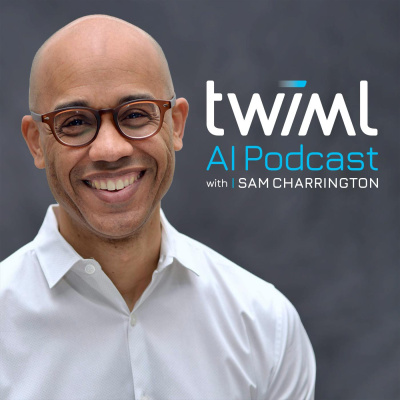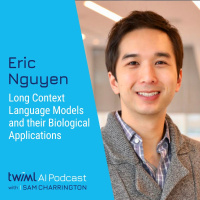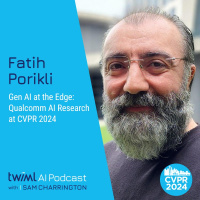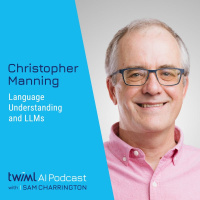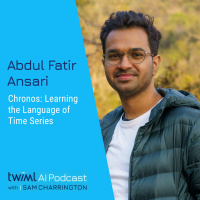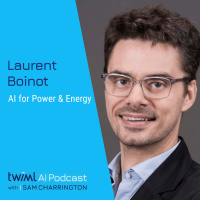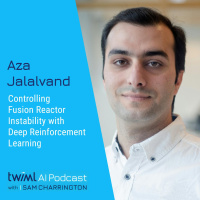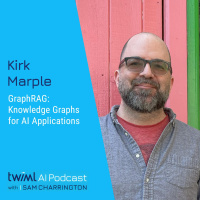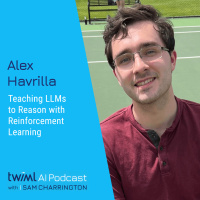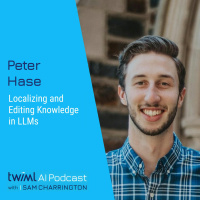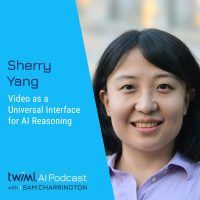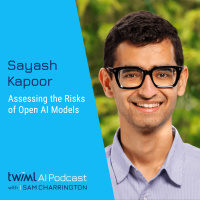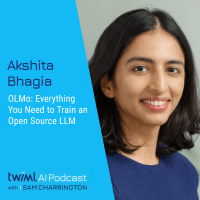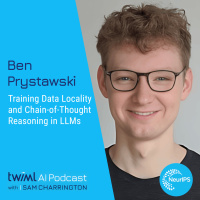Sinopsis
This Week in Machine Learning & AI is the most popular podcast of its kind. TWiML & AI caters to a highly-targeted audience of machine learning & AI enthusiasts. They are data scientists, developers, founders, CTOs, engineers, architects, IT & product leaders, as well as tech-savvy business leaders. These creators, builders, makers and influencers value TWiML as an authentic, trusted and insightful guide to all thats interesting and important in the world of machine learning and AI.Technologies covered include: machine learning, artificial intelligence, deep learning, natural language processing, neural networks, analytics, deep learning and more.
Episodios
-
How Microsoft Scales Testing and Safety for Generative AI with Sarah Bird - #691
01/07/2024 Duración: 57minToday, we're joined by Sarah Bird, chief product officer of responsible AI at Microsoft. We discuss the testing and evaluation techniques Microsoft applies to ensure safe deployment and use of generative AI, large language models, and image generation. In our conversation, we explore the unique risks and challenges presented by generative AI, the balance between fairness and security concerns, the application of adaptive and layered defense strategies for rapid response to unforeseen AI behaviors, the importance of automated AI safety testing and evaluation alongside human judgment, and the implementation of red teaming and governance. Sarah also shares learnings from Microsoft's ‘Tay’ and ‘Bing Chat’ incidents along with her thoughts on the rapidly evolving GenAI landscape. The complete show notes for this episode can be found at https://twimlai.com/go/691.
-
Long Context Language Models and their Biological Applications with Eric Nguyen - #690
25/06/2024 Duración: 45minToday, we're joined by Eric Nguyen, PhD student at Stanford University. In our conversation, we explore his research on long context foundation models and their application to biology particularly Hyena, and its evolution into Hyena DNA and Evo models. We discuss Hyena, a convolutional-based language model developed to tackle the challenges posed by long context lengths in language modeling. We dig into the limitations of transformers in dealing with longer sequences, the motivation for using convolutional models over transformers, its model training and architecture, the role of FFT in computational optimizations, and model explainability in long-sequence convolutions. We also talked about Hyena DNA, a genomic foundation model pre-trained on 1 million tokens, designed to capture long-range dependencies in DNA sequences. Finally, Eric introduces Evo, a 7 billion parameter hybrid model integrating attention layers with Hyena DNA's convolutional framework. We cover generating and designing DNA with language mod
-
Accelerating Sustainability with AI with Andres Ravinet - #689
18/06/2024 Duración: 47minToday, we're joined by Andres Ravinet, sustainability global black belt at Microsoft, to discuss the role of AI in sustainability. We explore real-world use cases where AI-driven solutions are leveraged to help tackle environmental and societal challenges, from early warning systems for extreme weather events to reducing food waste along the supply chain to conserving the Amazon rainforest. We cover the major threats that sustainability aims to address, the complexities in standardized sustainability compliance reporting, and the factors driving businesses to take a step toward sustainable practices. Lastly, Andres addresses the ways LLMs and generative AI can be applied towards the challenges of sustainability. The complete show notes for this episode can be found at https://twimlai.com/go/689.
-
Gen AI at the Edge: Qualcomm AI Research at CVPR 2024 with Fatih Porikli - #688
10/06/2024 Duración: 01h10minToday we’re joined by Fatih Porikli, senior director of technology at Qualcomm AI Research. In our conversation, we covered several of the Qualcomm team’s 16 accepted main track and workshop papers at this year’s CVPR conference. The papers span a variety of generative AI and traditional computer vision topics, with an emphasis on increased training and inference efficiency for mobile and edge deployment. We explore efficient diffusion models for text-to-image generation, grounded reasoning in videos using language models, real-time on-device 360° image generation for video portrait relighting, unique video-language model for situated interactions like fitness coaching, and visual reasoning model and benchmark for interpreting complex mathematical plots, and more! We also touched on several of the demos the team will be presenting at the conference, including multi-modal vision-language models (LLaVA) and parameter-efficient fine tuning (LoRA) on mobile phones. The complete show notes for this episode can be
-
Energy Star Ratings for AI Models with Sasha Luccioni - #687
03/06/2024 Duración: 48minToday, we're joined by Sasha Luccioni, AI and Climate lead at Hugging Face, to discuss the environmental impact of AI models. We dig into her recent research into the relative energy consumption of general purpose pre-trained models vs. task-specific, non-generative models for common AI tasks. We discuss the implications of the significant difference in efficiency and power consumption between the two types of models. Finally, we explore the complexities of energy efficiency and performance benchmarking, and talk through Sasha’s recent initiative, Energy Star Ratings for AI Models, a rating system designed to help AI users select and deploy models based on their energy efficiency. The complete show notes for this episode can be found at http://twimlai.com/go/687.
-
Language Understanding and LLMs with Christopher Manning - #686
27/05/2024 Duración: 56minToday, we're joined by Christopher Manning, the Thomas M. Siebel professor in Machine Learning at Stanford University and a recent recipient of the 2024 IEEE John von Neumann medal. In our conversation with Chris, we discuss his contributions to foundational research areas in NLP, including word embeddings and attention. We explore his perspectives on the intersection of linguistics and large language models, their ability to learn human language structures, and their potential to teach us about human language acquisition. We also dig into the concept of “intelligence” in language models, as well as the reasoning capabilities of LLMs. Finally, Chris shares his current research interests, alternative architectures he anticipates emerging beyond the LLM, and opportunities ahead in AI research. The complete show notes for this episode can be found at https://twimlai.com/go/686.
-
Chronos: Learning the Language of Time Series with Abdul Fatir Ansari - #685
20/05/2024 Duración: 43minToday we're joined by Abdul Fatir Ansari, a machine learning scientist at AWS AI Labs in Berlin, to discuss his paper, "Chronos: Learning the Language of Time Series." Fatir explains the challenges of leveraging pre-trained language models for time series forecasting. We explore the advantages of Chronos over statistical models, as well as its promising results in zero-shot forecasting benchmarks. Finally, we address critiques of Chronos, the ongoing research to improve synthetic data quality, and the potential for integrating Chronos into production systems. The complete show notes for this episode can be found at twimlai.com/go/685.
-
Powering AI with the World's Largest Computer Chip with Joel Hestness - #684
13/05/2024 Duración: 55minToday we're joined by Joel Hestness, principal research scientist and lead of the core machine learning team at Cerebras. We discuss Cerebras’ custom silicon for machine learning, Wafer Scale Engine 3, and how the latest version of the company’s single-chip platform for ML has evolved to support large language models. Joel shares how WSE3 differs from other AI hardware solutions, such as GPUs, TPUs, and AWS’ Inferentia, and talks through the homogenous design of the WSE chip and its memory architecture. We discuss software support for the platform, including support by open source ML frameworks like Pytorch, and support for different types of transformer-based models. Finally, Joel shares some of the research his team is pursuing to take advantage of the hardware's unique characteristics, including weight-sparse training, optimizers that leverage higher-order statistics, and more. The complete show notes for this episode can be found at twimlai.com/go/684.
-
AI for Power & Energy with Laurent Boinot - #683
07/05/2024 Duración: 49minToday we're joined by Laurent Boinot, power and utilities lead for the Americas at Microsoft, to discuss the intersection of AI and energy infrastructure. We discuss the many challenges faced by current power systems in North America and the role AI is beginning to play in driving efficiencies in areas like demand forecasting and grid optimization. Laurent shares a variety of examples along the way, including some of the ways utility companies are using AI to ensure secure systems, interact with customers, navigate internal knowledge bases, and design electrical transmission systems. We also discuss the future of nuclear power, and why electric vehicles might play a critical role in American energy management. The complete show notes for this episode can be found at twimlai.com/go/683.
-
Controlling Fusion Reactor Instability with Deep Reinforcement Learning with Aza Jalalvand - #682
29/04/2024 Duración: 42minToday we're joined by Azarakhsh (Aza) Jalalvand, a research scholar at Princeton University, to discuss his work using deep reinforcement learning to control plasma instabilities in nuclear fusion reactors. Aza explains his team developed a model to detect and avoid a fatal plasma instability called ‘tearing mode’. Aza walks us through the process of collecting and pre-processing the complex diagnostic data from fusion experiments, training the models, and deploying the controller algorithm on the DIII-D fusion research reactor. He shares insights from developing the controller and discusses the future challenges and opportunities for AI in enabling stable and efficient fusion energy production. The complete show notes for this episode can be found at twimlai.com/go/682.
-
GraphRAG: Knowledge Graphs for AI Applications with Kirk Marple - #681
22/04/2024 Duración: 47minToday we're joined by Kirk Marple, CEO and founder of Graphlit, to explore the emerging paradigm of "GraphRAG," or Graph Retrieval Augmented Generation. In our conversation, Kirk digs into the GraphRAG architecture and how Graphlit uses it to offer a multi-stage workflow for ingesting, processing, retrieving, and generating content using LLMs (like GPT-4) and other Generative AI tech. He shares how the system performs entity extraction to build a knowledge graph and how graph, vector, and object storage are integrated in the system. We dive into how the system uses “prompt compilation” to improve the results it gets from Large Language Models during generation. We conclude by discussing several use cases the approach supports, as well as future agent-based applications it enables. The complete show notes for this episode can be found at twimlai.com/go/681.
-
Teaching Large Language Models to Reason with Reinforcement Learning with Alex Havrilla - #680
16/04/2024 Duración: 46minToday we're joined by Alex Havrilla, a PhD student at Georgia Tech, to discuss "Teaching Large Language Models to Reason with Reinforcement Learning." Alex discusses the role of creativity and exploration in problem solving and explores the opportunities presented by applying reinforcement learning algorithms to the challenge of improving reasoning in large language models. Alex also shares his research on the effect of noise on language model training, highlighting the robustness of LLM architecture. Finally, we delve into the future of RL, and the potential of combining language models with traditional methods to achieve more robust AI reasoning. The complete show notes for this episode can be found at twimlai.com/go/680.
-
Localizing and Editing Knowledge in LLMs with Peter Hase - #679
08/04/2024 Duración: 49minToday we're joined by Peter Hase, a fifth-year PhD student at the University of North Carolina NLP lab. We discuss "scalable oversight", and the importance of developing a deeper understanding of how large neural networks make decisions. We learn how matrices are probed by interpretability researchers, and explore the two schools of thought regarding how LLMs store knowledge. Finally, we discuss the importance of deleting sensitive information from model weights, and how "easy-to-hard generalization" could increase the risk of releasing open-source foundation models. The complete show notes for this episode can be found at twimlai.com/go/679.
-
Coercing LLMs to Do and Reveal (Almost) Anything with Jonas Geiping - #678
01/04/2024 Duración: 48minToday we're joined by Jonas Geiping, a research group leader at the ELLIS Institute, to explore his paper: "Coercing LLMs to Do and Reveal (Almost) Anything". Jonas explains how neural networks can be exploited, highlighting the risk of deploying LLM agents that interact with the real world. We discuss the role of open models in enabling security research, the challenges of optimizing over certain constraints, and the ongoing difficulties in achieving robustness in neural networks. Finally, we delve into the future of AI security, and the need for a better approach to mitigate the risks posed by optimized adversarial attacks. The complete show notes for this episode can be found at twimlai.com/go/678.
-
V-JEPA, AI Reasoning from a Non-Generative Architecture with Mido Assran - #677
25/03/2024 Duración: 47minToday we’re joined by Mido Assran, a research scientist at Meta’s Fundamental AI Research (FAIR). In this conversation, we discuss V-JEPA, a new model being billed as “the next step in Yann LeCun's vision” for true artificial reasoning. V-JEPA, the video version of Meta’s Joint Embedding Predictive Architecture, aims to bridge the gap between human and machine intelligence by training models to learn abstract concepts in a more efficient predictive manner than generative models. V-JEPA uses a novel self-supervised training approach that allows it to learn from unlabeled video data without being distracted by pixel-level detail. Mido walks us through the process of developing the architecture and explains why it has the potential to revolutionize AI. The complete show notes for this episode can be found at twimlai.com/go/677.
-
Video as a Universal Interface for AI Reasoning with Sherry Yang - #676
18/03/2024 Duración: 49minToday we’re joined by Sherry Yang, senior research scientist at Google DeepMind and a PhD student at UC Berkeley. In this interview, we discuss her new paper, "Video as the New Language for Real-World Decision Making,” which explores how generative video models can play a role similar to language models as a way to solve tasks in the real world. Sherry draws the analogy between natural language as a unified representation of information and text prediction as a common task interface and demonstrates how video as a medium and generative video as a task exhibit similar properties. This formulation enables video generation models to play a variety of real-world roles as planners, agents, compute engines, and environment simulators. Finally, we explore UniSim, an interactive demo of Sherry's work and a preview of her vision for interacting with AI-generated environments. The complete show notes for this episode can be found at twimlai.com/go/676.
-
Assessing the Risks of Open AI Models with Sayash Kapoor - #675
11/03/2024 Duración: 40minToday we’re joined by Sayash Kapoor, a Ph.D. student in the Department of Computer Science at Princeton University. Sayash walks us through his paper: "On the Societal Impact of Open Foundation Models.” We dig into the controversy around AI safety, the risks and benefits of releasing open model weights, and how we can establish common ground for assessing the threats posed by AI. We discuss the application of the framework presented in the paper to specific risks, such as the biosecurity risk of open LLMs, as well as the growing problem of "Non Consensual Intimate Imagery" using open diffusion models. The complete show notes for this episode can be found at twimlai.com/go/675.
-
OLMo: Everything You Need to Train an Open Source LLM with Akshita Bhagia - #674
04/03/2024 Duración: 32minToday we’re joined by Akshita Bhagia, a senior research engineer at the Allen Institute for AI. Akshita joins us to discuss OLMo, a new open source language model with 7 billion and 1 billion variants, but with a key difference compared to similar models offered by Meta, Mistral, and others. Namely, the fact that AI2 has also published the dataset and key tools used to train the model. In our chat with Akshita, we dig into the OLMo models and the various projects falling under the OLMo umbrella, including Dolma, an open three-trillion-token corpus for language model pretraining, and Paloma, a benchmark and tooling for evaluating language model performance across a variety of domains. The complete show notes for this episode can be found at twimlai.com/go/674.
-
Training Data Locality and Chain-of-Thought Reasoning in LLMs with Ben Prystawski - #673
26/02/2024 Duración: 25minToday we’re joined by Ben Prystawski, a PhD student in the Department of Psychology at Stanford University working at the intersection of cognitive science and machine learning. Our conversation centers on Ben’s recent paper, “Why think step by step? Reasoning emerges from the locality of experience,” which he recently presented at NeurIPS 2023. In this conversation, we start out exploring basic questions about LLM reasoning, including whether it exists, how we can define it, and how techniques like chain-of-thought reasoning appear to strengthen it. We then dig into the details of Ben’s paper, which aims to understand why thinking step-by-step is effective and demonstrates that local structure is the key property of LLM training data that enables it. The complete show notes for this episode can be found at twimlai.com/go/673.
-
Reasoning Over Complex Documents with DocLLM with Armineh Nourbakhsh - #672
19/02/2024 Duración: 45minToday we're joined by Armineh Nourbakhsh of JP Morgan AI Research to discuss the development and capabilities of DocLLM, a layout-aware large language model for multimodal document understanding. Armineh provides a historical overview of the challenges of document AI and an introduction to the DocLLM model. Armineh explains how this model, distinct from both traditional LLMs and document AI models, incorporates both textual semantics and spatial layout in processing enterprise documents like reports and complex contracts. We dig into her team’s approach to training DocLLM, their choice of a generative model as opposed to an encoder-based approach, the datasets they used to build the model, their approach to incorporating layout information, and the various ways they evaluated the model’s performance. The complete show notes for this episode can be found at twimlai.com/go/672.
